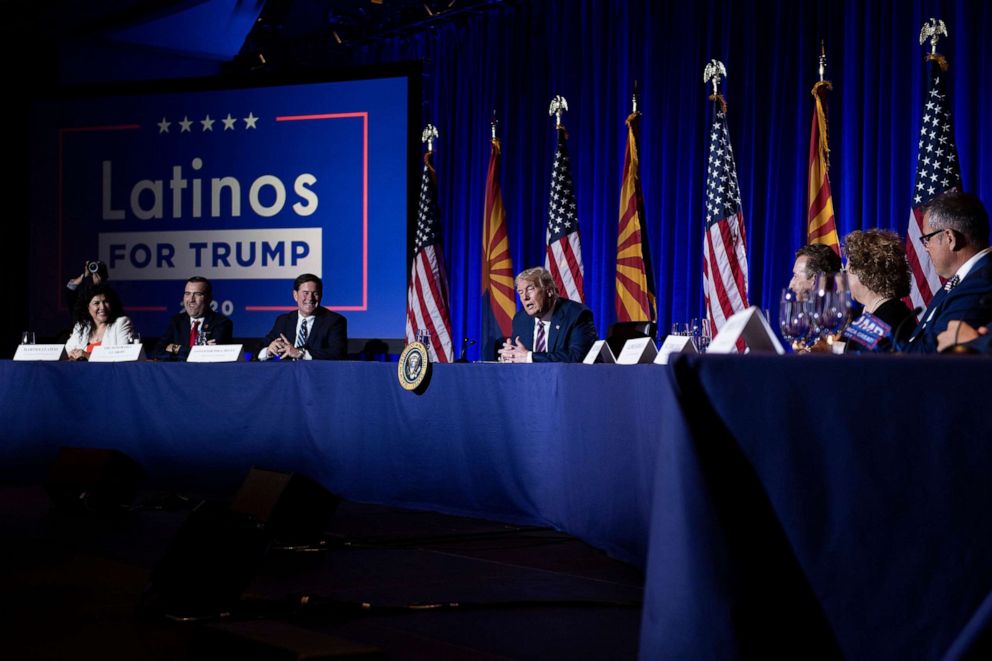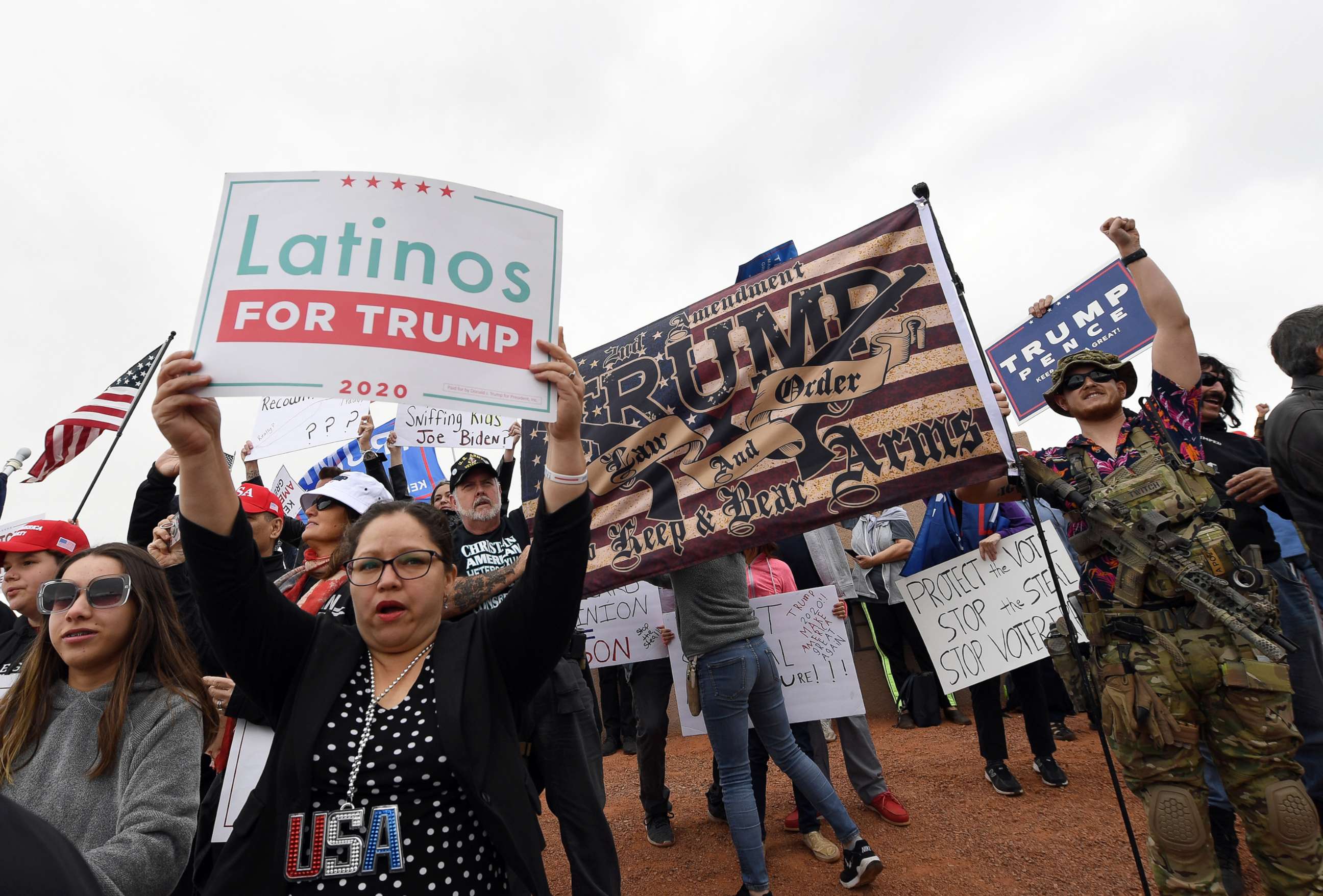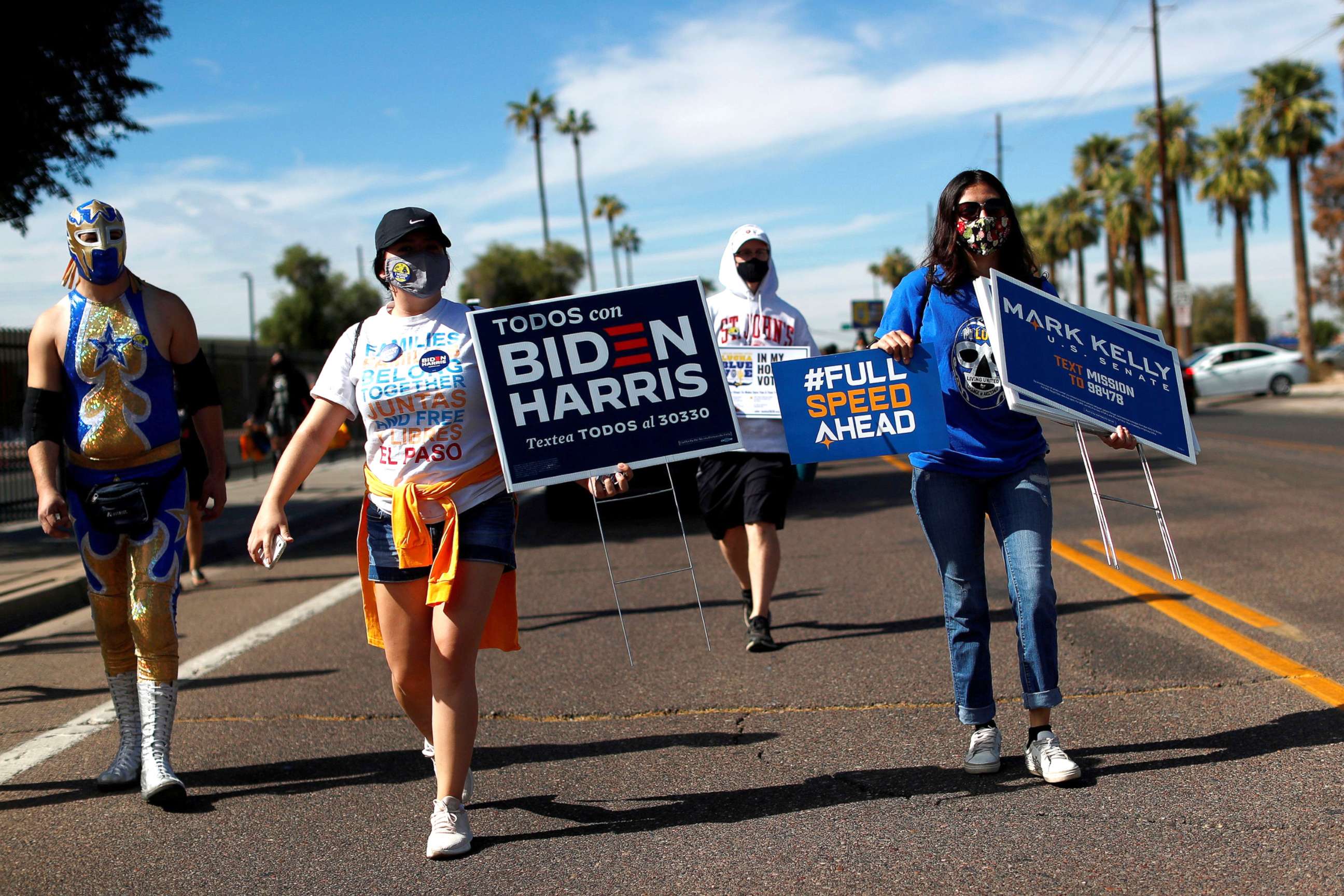Misinformation targeted Latino voters in the 2020 election
Misleading memes and videos went viral in some Latino communities.
As part of her work as a volunteer with Cubanos con Biden in Miami, JennyLee Molina managed several social media groups dedicated to debunking political memes, pictures and videos that were circulating among Latinos in South Florida, a task made even more daunting by the sheer quantity of content shared weeks leading up to the election.
"We dealt with hundreds of items a day," said Molina, who also works in digital communications with Joe Biden for President. "It was like swimming against a tide because every time we got one strong piece of information out there, there would be 10 more things even more outrageous to deal with. It was like whack-a-mole."
Advocacy groups have voiced concerns over the "alarming" amount of misinformation targeted to Latino communities prior to the election, though it's unclear to what extent misinformation may have influenced Latino voters.
What the election outcome has demonstrated -- and what Latinos and advocates have been saying for years -- is that the Latino vote is powerful and complex. While nationally, the majority may lean Democratic, when it comes to the state level, there are many different constituencies that cannot be so easily counted on by Democrats or Republicans.

There were about 32 million Latinos eligible to vote in the 2020 election.
According to ABC News' exit polls, 59% of Latino men voted Democrat; 36% voted Republican. Sixty-nine percent of Latinas voted Democrat and 30% voted Republican.
Republicans made some gains with Latino voters since the 2016 election, particularly in South Florida and border communities in Texas, the Washington Post reported.
Biden, however, made gains in other states, helped by a record number of Latino voters who cast early votes in Arizona, Nevada, Georgia, Pennsylvania and Wisconsin, according to Voto Latino.
ABC News interviewed disinformation experts, campaign workers, and advocates on both sides of the political spectrum to get a sense of what factors were at play in the minds of Latino voters across the country this year.
The most overarching and effective disinformation narrative, according to Jaime Longoria, an investigative researcher with First Draft News, was an effort to play on what he called an "anti-Blackness" tactic -- a part of the push of disinformation to Latino voters, particularly in Florida.
Longoria said videos of confrontations shared on WhatsApp and Facebook pushed the notion that Black people were "harassing" Latinos under the guise of activism. He said much of this content played to prejudices. "A lot of folks don't have the nuance to understand that there are black and indigenous people in Latinx communities."
He cited an example of a video shared on Facebook last month, appearing to show two Black women flipping a table and chairs being used by a Latino family to celebrate a party. The video went viral with a title labeling the women as members of Black Lives Matter. Despite being flagged with a fact-check tag on Facebook noting that the women were not affiliated with Black Lives Matter, the video has been shared nearly 180,000 times on that platform alone.
Longoria said misleading videos attach to people's conscious and unconscious biases.
"You take advantage of harbored anti-Blackness and people are quick to jump on things which reinforce their own prejudices," he said. "[The misinformation content] was never blatant racism, it was a little more nuanced."
Meghna Mahadevan, the chief disinformation dissent strategist with United We Dream, a youth-led immigrant organization, said anti-Blackness is an effective manipulation strategy, pitting communities against each other. She said the tactic "uplifts racism," allows people to "create scapegoats" and "preyed on feelings of racial hierarchy that already exist in communities."
"It creates different racial hierarchies because at the end of the day, whiteness and being a person of color are very different, but by building anti-Blackness in the Latinx community, it creates a ladder of supremacy and uses race to create more separation, particularly with Black Lives Matter," she said.
But it's worth remembering that seven in 10 Latino voters backed President Barack Obama in 2012, according to exit polls, helping him win that election.
Exploiting people's painful history
One disinformation narrative which Longoria called "very effective" for Cubans and Nicaraguans in South Florida, pushed the idea that Black Lives Matter was a "communist conspiracy."
"I think historically what we know in Latin America is that a lot of revolutions have been led by people who look a lot like those in the streets right now," he said. "They are co-opting not only racial tension but the histories of where these people come from."
Using the trauma of past experiences to sow partisan divide was something Molina had to constantly fight against in her work and personal life. The daughter of Cuban immigrants, Molina said she was often made to feel that she was betraying or dishonoring the pain of her family by being pro-Biden because of a concerted misinformation campaign to label him a "communista." She said this was an issue with Cubans, Venezuelans and Nicaraguans in South Florida, who were targeted with misinformation to "exploit their pain."

"The worst thing," for many people in these communities, is to be called "a communist or a socialist," Molina said. "Biden's career proves he is not a communist, but the ads and memes about him being a 'Trojan horse for communism,' were never ending."
Molina said countering incorrect claims about the communist or socialist affiliations of Joe Biden or Kamala Harris became a full-time job, and the inability to scream louder than the misinformation was, she believes, "the number one reason we didn't get the same vote as we did in 2016."
Another major challenge, she said, was grappling with the technological illiteracy of older voters, many of whom she said could not tell the difference between a photoshopped image and an authentic one.
She cited an example of a viral picture of Barack Obama in Cuba with an image of Che Guevara photoshopped onto his shirt. Molina said the fake image, which has been circulating online for years, reappeared on social media in the weeks before the election.
"We made a meme of the real one and the fake one side-by-side, but that doesn't get shared as much as the original meme," she added.
While social media is a powerful tool for misinformation to run rampant, a lot of fearmongering can happen inside the homes of multi-generational families often living under the same roof, according to Billy Corben, the Miami-based filmmaker and director of "537 Votes," a documentary about the contested outcome of the 2000 presidential election.
"Dissent is stifled, you don't argue with abuelo and abuela at the dinner table, so you get indoctrinated or you suffer in silence until you can move on and exercise your ideals," he said.
Still, Latino youth have not been disheartened in making their voices heard. In 2008, Latino youth supported Obama over John McCain by a margin of 76% versus 19% according to Pew Research.
Along with misinformation passed between families, which is impossible to track, Corben said Spanish-language media played a significant role in painting Democrats as communists in South Florida. "These media outlets are not policed the same as mainstream English-language ones are, so they do and say whatever they want a lot of the time," he added.
Puerto Rican voters
Another major Latino group was Puerto Ricans, the second-largest Hispanic population in the United States. Overall, support for Biden among Puerto Ricans in Florida was nearly 70%, according to exit polling from Edison Research, but an analysis by the Miami Herald found Trump gained ground in two Florida counties with the largest Puerto Rican communities in the state.
Longoria said there were many misleading claims about Biden's relationship and history with Puerto Rico in television and digital ads from the Trump campaign. Many of the allegations focused on Biden voting to remove Section 936, which ended a long-standing tax break for U.S. businesses, mostly from the pharmaceutical industry, in Puerto Rico. As a result, many companies left the island, resulting in major job losses.
Longoria said counter to the claims made in Trump ads on the subject, removing Section 936 had broad support among Republicans and Democrats at the time and was seen as eliminating an unfair provision.
"When it comes to targeting Puerto Ricans, most of that was coming from the Trump campaign," Longoria said. "It used examples to create this image that the only person who has been helping Puerto Rico was Trump."
Latino Trump voters
Amid allegations of targeted misinformation campaigns, there are very real issues that some experts say may have swayed some Latinos to vote for President Trump.
Ray Baca, the founder of Border Hispanics for Trump, based in El Paso, Texas, said there are certain tenets of the Republican Party which will generally appeal to Latinos, including the party's opposition to abortion and its hardline stance on immigration.
Baca, the son of two Mexican immigrants to the United States, said the immigration issue was a lived experience for so many Latinos in border communities.

"You can't have open borders because it will hurt employment and there will be a softening of the economy because of too many people being available for too few jobs," Baca said. "I think many of us at the border recognize the circumstances that lead people to come here. My father did the same thing, he took an opportunity to escape, but he did it legally."
Bertica Cabrera Morris, a native of Cuba and a member of the Latinos for Trump advisory board, said she feels her support for Trump was based entirely on "promises made and promises kept."
"Trump showed up for us, he came and asked-what are the biggest issues affecting you," she told ABC News.
Baca said he thinks that more Latinos will vote Republican in upcoming elections because it is a party associated with being a proud American. "I am proud of my heritage, but I don't consider myself Mexican, I consider myself American," he said, adding that more Latino voters turning out for Trump was a silver lining in the overall vote results. "We hope it's the start of a movement."




